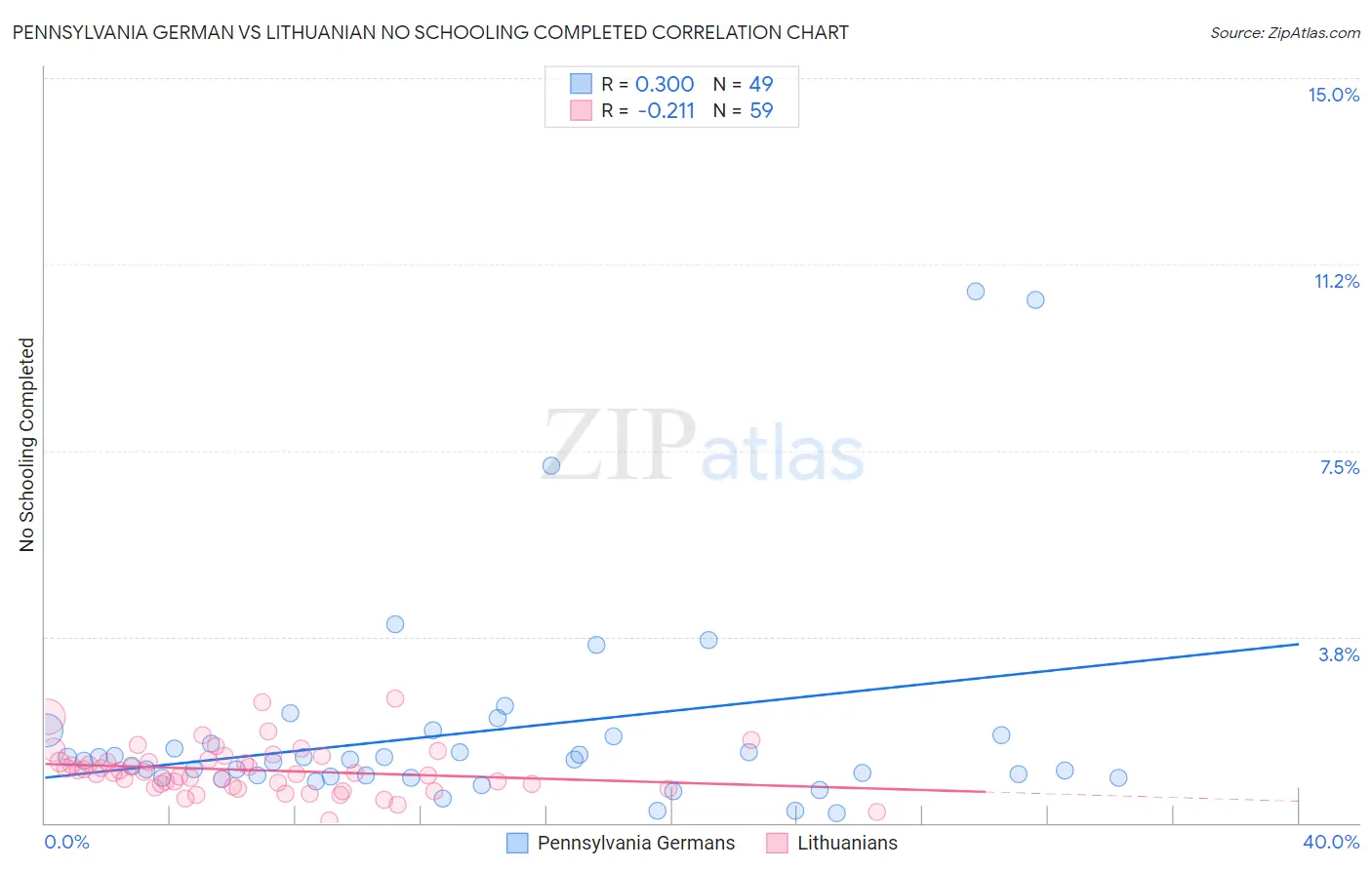Pennsylvania German vs Lithuanian No Schooling Completed
COMPARE
Pennsylvania German
Lithuanian
No Schooling Completed
No Schooling Completed Comparison
Pennsylvania Germans
Lithuanians
1.5%
NO SCHOOLING COMPLETED
100.0/ 100
METRIC RATING
24th/ 347
METRIC RANK
1.4%
NO SCHOOLING COMPLETED
100.0/ 100
METRIC RATING
11th/ 347
METRIC RANK
Pennsylvania German vs Lithuanian No Schooling Completed Correlation Chart
The statistical analysis conducted on geographies consisting of 231,584,755 people shows a mild positive correlation between the proportion of Pennsylvania Germans and percentage of population with no schooling in the United States with a correlation coefficient (R) of 0.300 and weighted average of 1.5%. Similarly, the statistical analysis conducted on geographies consisting of 415,193,435 people shows a weak negative correlation between the proportion of Lithuanians and percentage of population with no schooling in the United States with a correlation coefficient (R) of -0.211 and weighted average of 1.4%, a difference of 3.2%.

No Schooling Completed Correlation Summary
| Measurement | Pennsylvania German | Lithuanian |
| Minimum | 0.19% | 0.047% |
| Maximum | 10.7% | 2.5% |
| Range | 10.5% | 2.5% |
| Mean | 1.8% | 1.1% |
| Median | 1.3% | 1.0% |
| Interquartile 25% (IQ1) | 0.92% | 0.74% |
| Interquartile 75% (IQ3) | 1.8% | 1.3% |
| Interquartile Range (IQR) | 0.83% | 0.55% |
| Standard Deviation (Sample) | 2.2% | 0.48% |
| Standard Deviation (Population) | 2.1% | 0.47% |
Demographics Similar to Pennsylvania Germans and Lithuanians by No Schooling Completed
In terms of no schooling completed, the demographic groups most similar to Pennsylvania Germans are French (1.5%, a difference of 0.020%), European (1.5%, a difference of 0.35%), Alaska Native (1.5%, a difference of 0.61%), Czech (1.5%, a difference of 0.61%), and Chinese (1.5%, a difference of 0.70%). Similarly, the demographic groups most similar to Lithuanians are Irish (1.4%, a difference of 0.030%), Polish (1.4%, a difference of 0.050%), Dutch (1.4%, a difference of 0.84%), Scotch-Irish (1.5%, a difference of 1.0%), and Tlingit-Haida (1.5%, a difference of 1.1%).
| Demographics | Rating | Rank | No Schooling Completed |
| English | 100.0 /100 | #7 | Exceptional 1.4% |
| Swedes | 100.0 /100 | #8 | Exceptional 1.4% |
| Scottish | 100.0 /100 | #9 | Exceptional 1.4% |
| Dutch | 100.0 /100 | #10 | Exceptional 1.4% |
| Lithuanians | 100.0 /100 | #11 | Exceptional 1.4% |
| Irish | 100.0 /100 | #12 | Exceptional 1.4% |
| Poles | 100.0 /100 | #13 | Exceptional 1.4% |
| Scotch-Irish | 100.0 /100 | #14 | Exceptional 1.5% |
| Tlingit-Haida | 100.0 /100 | #15 | Exceptional 1.5% |
| Finns | 100.0 /100 | #16 | Exceptional 1.5% |
| Croatians | 100.0 /100 | #17 | Exceptional 1.5% |
| Danes | 100.0 /100 | #18 | Exceptional 1.5% |
| Alaskan Athabascans | 100.0 /100 | #19 | Exceptional 1.5% |
| Welsh | 100.0 /100 | #20 | Exceptional 1.5% |
| Chinese | 100.0 /100 | #21 | Exceptional 1.5% |
| Alaska Natives | 100.0 /100 | #22 | Exceptional 1.5% |
| Europeans | 100.0 /100 | #23 | Exceptional 1.5% |
| Pennsylvania Germans | 100.0 /100 | #24 | Exceptional 1.5% |
| French | 100.0 /100 | #25 | Exceptional 1.5% |
| Czechs | 100.0 /100 | #26 | Exceptional 1.5% |
| Scandinavians | 100.0 /100 | #27 | Exceptional 1.5% |